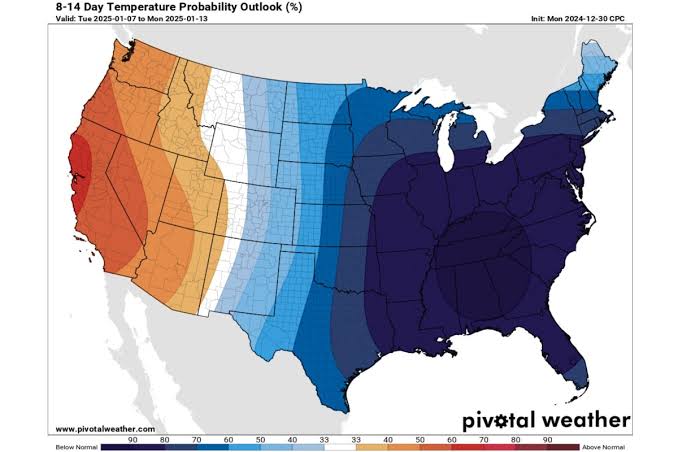Brace Yourself: Polar Vortex to Unleash Record-Breaking Cold and Deadly Winter Storms Across the U.S.
By mid-January, frigid air driven by pieces of the polar vortex is expected to sweep into parts of the United States, including the South and Southeast, potentially breaking records. This pattern also increases the likelihood of significant winter storms, creating a challenging start to the new year for many regions.
What’s Happening?
Meteorologists project that fragments of the polar vortex will descend southward from northern Canada into parts of the U.S. during early and mid-January. The accompanying weather pattern involves:
•A strong high-pressure system over Greenland.
•A deep dip in the jet stream across the Eastern U.S.
This configuration is particularly conducive to producing major snowstorms, with the Southeast, Mid-Atlantic, and Northeast at risk of seeing heavy snowfall.
Potential Impact Areas
Computer models indicate that the South, including states from Texas to Alabama, as well as the Southeast and Appalachians, could experience the brunt of the coldest air. This rare setup may lead to extreme temperature drops and significant snowfall, especially in areas unaccustomed to such severe winter weather.
Threats and Challenges
1.Record-breaking cold: The frigid air could strain infrastructure, especially in regions not built to handle such extreme temperatures.
2.Power outages: The most severe scenarios may result in widespread power outages due to increased energy demand and potential damage to power lines from ice or snow.
3.Travel disruptions: Significant snowstorms and icy conditions could make travel hazardous across affected areas.

Uncertainty Remains
While there is considerable agreement among forecast models about the general setup, uncertainties remain regarding the exact magnitude of the cold and the areas that will be hardest hit. The specific timing and track of potential winter storms will also become clearer as the pattern evolves.
What to Expect
•Cold air: Expect a deep freeze to settle across much of the South and Southeast, with temperatures dropping well below seasonal norms.
•Snowstorms: The unique jet stream configuration heightens the risk of blockbuster snowstorms from the Southeast to the Northeast, bringing the possibility of heavy accumulations and disruptions.
Preparation Tips
Residents in the affected areas should monitor local forecasts and prepare for potential impacts, including:
•Insulating homes against the cold.
•Stocking up on essential supplies in case of power outages.
•Staying informed about road conditions and travel advisories.
As January progresses, updates will refine the forecast, but one thing is clear: this could be a winter weather event to remember, with widespread implications for millions of Americans.


Comments are closed, but trackbacks and pingbacks are open.